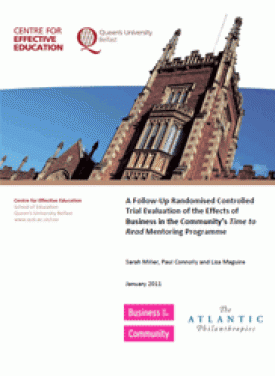Business in the Community’s Time to Read Pupil Mentoring Programme
Resource type: Evaluation
Queen's University Belfast |
A programme in Northern Ireland to improve children’s reading skills showed positive effects in reading outcomes, according to a 2009-2010 evaluation by the Centre for Effective Education, Queen’s University Belfast. The randomised controlled trial examined the Time to Read programme, which targets children in primary schools.
The programme was carried out by Business in the Community, a membership organisation of businesses, in partnership with local Education and Library Boards.
> Download the Executive Summary (PDF)
> Download the Full Research Report (PDF)
“I think my son Colin has really benefited from having a Time to Read volunteer. He reads a lot more at home and I am now buying him books, which he chooses himself. He says that Maria is making his reading more enjoyable and he can’t wait for every Thursday to come around.”
—Anne McGeown, parent, St. John the Baptist PS, Belfast
The Situation
Low levels of literacy present a huge cost to the economy in Northern Ireland and significantly reduce the prospects of some of the next generation of workers. Some 20 per cent of students move to post primary school with poor standards of literacy, according to The Taskforce on Literacy & Numeracy for Northern Ireland.
The Work
Atlantic funded Business in the Community to send volunteer mentors from companies who spend one hour per week of company time to work one-to-one with children on their reading skills. The programme has a particular emphasis on socially deprived areas and operates in more than 130 primary schools with more than 1,000 children supported.
The benefits of Time to Read from the perspective of business volunteers and schools. Source: Business in the Community
The Findings
Atlantic supported a 2008 evaluation that found that the programme had a positive effect on increasing the children’s future aspirations. It did not show any effects in relation to other outcome areas including reading skills. However, the evaluation may have not been designed to capture those other areas. As a result, Atlantic supported a second randomised controlled evaluation.
The 2009-2010 evaluation found clear evidence that the Time to Read mentoring programme is effective in improving a number of reading outcomes for children. The evaluators noted that the programme is particularly useful in building the foundational skills children need to become effective readers (i.e., decoding, reading rate and reading fluency). The study also found that the size of the effects of Time to Read compare favourably with similar volunteer mentoring programmes internationally, placing it in the top third of the most effective programmes evaluated to date.
The trial—one of the largest evaluations of its type—involved 512 children from 50 primary schools across Northern Ireland. Other key findings of the evaluation were:
- There is strong evidence that the intensity of the programme matters. Those children who received more mentoring sessions showed better reading fluency and enjoyment of reading than children who received fewer sessions.The programme worked as effectively for boys and girls; for those from different socio-economic backgrounds; and also for those with varying initial reading abilities.
- In relation to the children’s higher level reading skills, particularly comprehension, and also their enjoyment of reading and reading confidence, the evaluation was unable to show any significant effects.
Next Steps
As a result of the evidence of effectiveness shown in the evaluations, Business in the Community plans to roll out the programme to the majority of primary schools in Northern Ireland.
Business in the Community is an Atlantic grantee.
